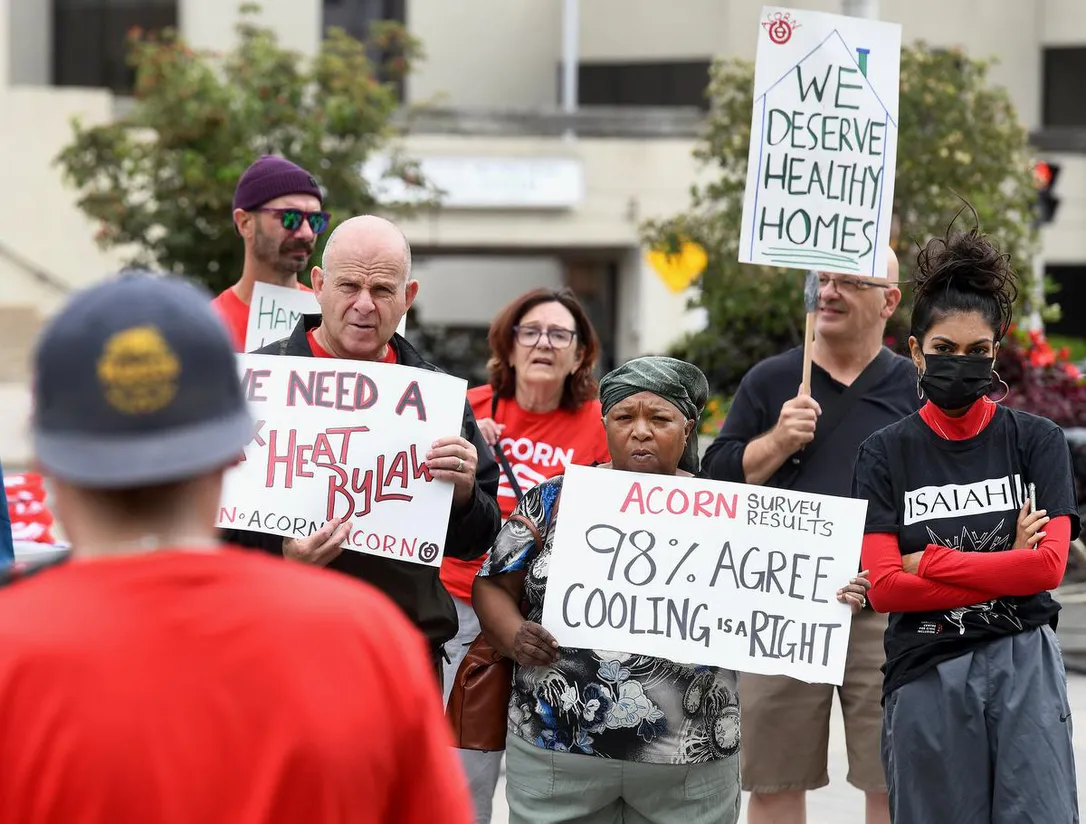Hamilton Spectator: ACORN members demand bylaw to help tenants deal with extreme heat
Posted September 8, 2022
Cooler days of fall weather are around the corner. But that hasn’t stopped ACORN Hamilton from launching its beat the heat campaign.
On Wednesday, members of the community group — which tackles a lot of tenant-based issues in Hamilton — gathered outside city hall to demand councillors pass a “maximum heat bylaw.”
“It’s got to start somewhere,” Stewart Klazinga, a member of ACORN Hamilton, told The Spectator.
The group is asking the city to pass a bylaw that would make landlords responsible for providing cooling units and establishing 26 C “as a maximum indoor temperature.”
Some Ontario cities, including Mississauga and Ajax, require landlords to keep indoor air temperatures lower than 26 C when the unit is equipped with an air conditioner, ACORN said in its report published this month.
For Zakery Rodrigues and his family, staying comfortable during extreme heat has become a chore at their rental.
“The temperature inside the apartment goes up to 32 degrees Celsius when it’s only 28 degrees Celsius outside,” Rodrigues told The Spectator. “That’s insane.”
Rodrigues has been living with his fiancé, Lindsey Young, and their toddler on the top floor of the six-unit 999 Cannon St. E. apartment building for two years. On peak summer days, they’re forced to keep their three air conditioners “running constantly” to keep it cool — also sending their hydro bill soaring to mid-triple digits.
They bought the AC units over the years as Hamilton’s heat continues to get unbearable. They weren’t provided by the landlord.
Young said the apartment got a new window recently. But it hasn’t helped from cooking inside on a hot, sultry summer day.
“This (bylaw) needs to not wait. Not next summer. Not after the election,” said Karl Andrus, a manager at Hamilton Community Benefits Network.
“We don’t allow people to freeze to death in their homes, they shouldn’t boil or bake (either).”
Hamilton approved a minimum heat bylaw two decades ago, asking landlords to maintain minimum 20 C “in all habitable spaces.”
Members of ACORN Hamilton want a similar bylaw for those struggling with extreme heat during the summer, especially after getting a survey completed this summer.
In June, the advocacy group began circulating its extreme heat tenant survey to gauge the impacts of heat among those living in rental units — as the temperatures and humidity started spiking.
The results showed 70 per cent of the 120 respondents were affected by extreme heat, with many suffering from poor sleep, headaches, fatigue and loss of concentration.
This year, Hamilton saw 101 consecutive days of temperatures above 20 C and scarce rainfall between May 26 and Sept. 3.
“We’ve locked in the climate change that we’re seeing now. It will only get worse,” said Ian Borsuk, climate-change campaign co-ordinator with Environment Hamilton, who showed support to ACORN’s campaign.
He noted extreme heat was already known to seriously impact health as a result of climate change.
“But just because you rent doesn’t mean you have to suffer from cognitive disability, from health impacts, and simply being uncomfortable,” Borsuk said.
ACORN’s report showed most individuals suffering from the impacts of extreme heat were from low-income households.
The advocacy group has also demanded the city track heat-related deaths and illnesses, expand public spaces for people to keep cool, and develop a program to reduce energy consumption and “retrofit older market affordable housing” to adapt to climate change.
The city systematically issues heat warnings for temperatures and humidity increases during the summer. It also provides “cool places” for residents to go to during a heat warning, while all open public swims are free. This summer, over 10 city-run pools were open. Cooling sites were identified with “Cool Down Here” sign at the entrance.
***
Article by Ritika Dubey for the Hamilton Spectator

